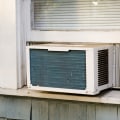Many people get confused when it comes to selecting the right size air conditioner for their home. But calculating the correct size for your living room isn't rocket science. You can find out what size air conditioner you need with some basic calculations and taking into account the characteristics of your home. Cooling capacity is measured in BTU or tonnage, depending on the type of air conditioner.
You must select the size of the air conditioner depending on the dimensions of the room or house you want to cool. This applies to all types of air conditioners, including portable and window models. Choosing the right air conditioner size for the size of your space can help you save energy and reduce wear and tear on the unit, so you won't need to maintain or replace it as often. Generally, mounting the air conditioner unit as high as possible on the wall allows it to circulate and cool the air more efficiently.
Modern air conditioners are often more efficient than older models, so you can often achieve more effective cooling and save on energy bills by replacing worn-out units with new ones.
BTU
stands for British Thermal Unit. This unit measures the amount of energy needed to heat 1 degree Fahrenheit (1 pound) of water to sea level. BTUs are used to describe how quickly a portable or window air conditioner unit can cool the air.The higher the BTU rating, the greater the cooling capacity of the air conditioner. In general, you'll want to choose an air conditioner with a high BTU rating if you have a large room. According to the Department of Energy, you can calculate the size of air conditioner you need by multiplying the square footage of your room or house by 20 BTU. Household air conditioners generally have a BTU between 5,000 and 14,000 BTU.
If your calculation returns a BTU rating lower than this figure because your room dimensions are small, the best thing to do is to buy the air conditioner with the lowest number of BTUs you can find. However, several other factors could mean that you need a larger air conditioner than the square footage calculation suggests. Rooms with high ceilings or that get a lot of sunlight will be harder to cool, so you should consider buying a slightly larger unit. Likewise, rooms that are frequently used by several occupants simultaneously or that contain appliances that generate heat, such as ovens, may also require a higher amount of BTUs per square foot.
There are several online BTU calculators available that consider the square footage of your home combined with additional factors. A common mistake many people make is to assume that a bigger air conditioner is always better. In fact, it's counterproductive to buy a large air conditioner with a high BTU rating if you're only trying to cool a small space. Although the air conditioner will initially cool the room very quickly, it will likely turn off only once the air reaches the desired temperature.
This can cause a cycle where the unit has to be restarted frequently when the room heats up again, which hurts electricity bills and can cause excessive wear and tear on the unit itself. Conversely, using a portable or window air conditioner unit with a BTU rating that is too low will prevent the unit from cooling the space efficiently and may mean that you can't reach a comfortable temperature. The air conditioner will also have to work harder, which could shorten its lifespan.
Tonnage
does not refer to the weight of an air conditioner. Instead, it refers to its cooling capacity.One ton equals 12,000 BTU. Unless you buy a central air conditioner, you'll usually find its cooling capacity listed in BTU rather than tonnage. You can use an online air conditioner tonnage calculator (like this one from AC Direct) to determine how many tons your air conditioner should have. Alternatively, you can convert BTUs to tons and calculate its required tonnage using its square footage of your house. When buying a new air conditioning system, it must be the right size to meet your cooling needs in order for it to be effective and efficient in its performance and energy consumption.
These ratings are within increments of 0.5 tons and create an accurate idea of what size air conditioner is needed for your home based on environmental and home characteristics such as square footage, ceiling height, sunlight exposure and number of occupants in each room or house. The right size air conditioner will give you optimal results in comfort, performance and energy efficiency while saving money on energy bills and reducing wear and tear on your unit over time.


